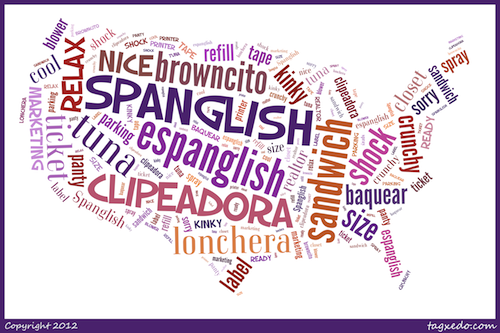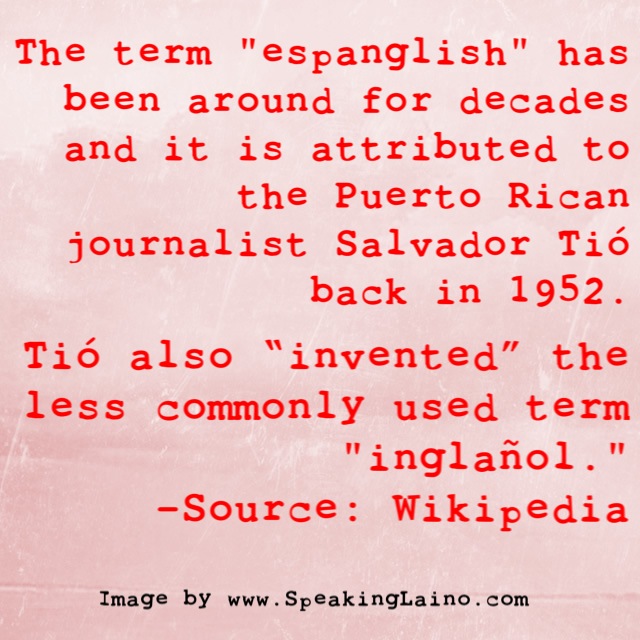
Last week the Royal Academy of Spanish Language (RAE, in Spanish) announced the incorporation of the word espanglish (or Spanglish) in the next edition of their dictionary that will be published in 2014. The definition that will accompany this term reads as follow:
“A form of speech used by some Hispanic groups in the United States, in which they mix deformed elements of vocabulary and grammar from both Spanish and English.”
At first I was so excited about this news. But after reading the definition and sharing it with Jared we were both uncomfortable with the word “deformed.” Since I first read the news in English, Jared suggested that it could be a translation misinterpretation. I went back a look for the original definition in Spanish:
“Modalidad del habla de algunos grupos hispanos de los Estados Unidos, en la que se mezclan, deformándolos, elementos léxicos y gramaticales del español y del inglés.”
 Deformándolos, there’s the word again! The thing is that we were not alone, after share the news in the Speaking Latino Facebook Page the reactions were just the same. “I have a problem with their use of the word “deformed” and “Hate the word “deformed,” too!” were some of the comments.
Deformándolos, there’s the word again! The thing is that we were not alone, after share the news in the Speaking Latino Facebook Page the reactions were just the same. “I have a problem with their use of the word “deformed” and “Hate the word “deformed,” too!” were some of the comments.
According to RAE, the verb deformar means “to make something lose its regular or natural form.” The issue that is not addressed in this definition is the negative connotation that the result of this action has. Why they didn’t use other synonyms such as cambiar (to change), modificar (to modify), transformar (to transform) or even a blend? Maybe they were not happy with including Espanglish and wanted to express this with a puritanical attitude that the language has been “deformed”. Just a reminder: the modern Spanish language came from the vulgar Latin and other dialects of Iberia; even Arabic had a lot influence in today’s Spanish vocabulary.
Coming from Puerto Rico, where we wear zapatos browncitos and use clipeadoras (staplers) instead for grapadoras, Spanglish is just a common thing for me. That is why I agree with the “language evolution” idea presented by Rease Kirchner in her post Spanglish: Language Pollution or Language Evolution?. Not everyone in Puerto Rico will agree with this, but with Latinos at 16.3% of the total United States population (not including the additional 3.7 million living in Puerto Rico) it will be hard to avoid. So my final words to the Royal Academy of Spanish Language are: EMBRACE SPANGLISH.
Suggested Readings on Spanglish
1. ‘Espanglish’ Accepted by Spain’s Most Prestigious Dictionary | News release from Fox News Latino
2. The evolving interface of U. S. Spanish: language mixing as hybrid vigor an investigation by John M. Lipski | Download the PDF here.
3. Spanglish: Language Pollution or Language Evolution?
4. Statistics about the Hispanic population in the United States
5. El idioma es la sangre del espíritu | Idioma defectuoso, pensamiento defectuoso | A TV campaign about Spanglish in Puerto Rico
6. Los Estadounidismos | Post from Fundación Español Urgente
What are you thoughts about Spanglish and the use of the word “deformed” in the definition?
Check out these other English Spanish articles.